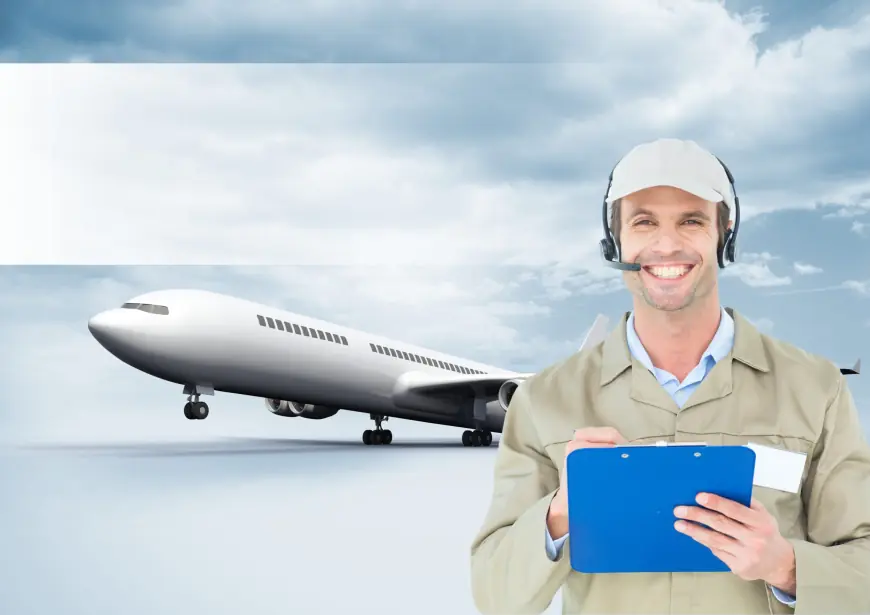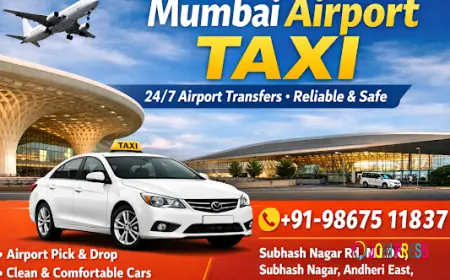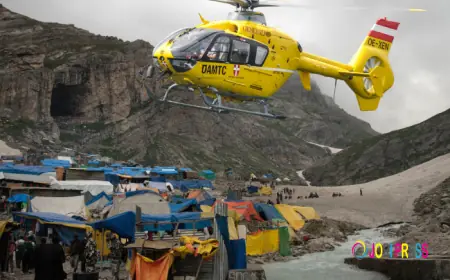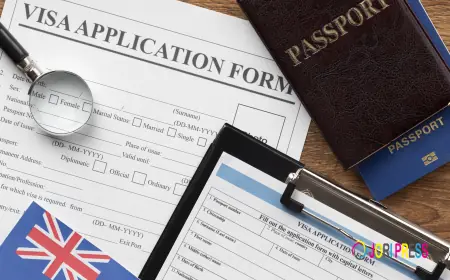How Aviation Security Services Ensure Passenger and Cargo Safety
Discover how aviation security services in India ensure the safety of passengers and cargo. Learn how Continuum-Aviation delivers advanced, compliant, and reliable security solutions across India's rapidly growing aviation sector.

As the world becomes more interconnected, air travel has transformed from a luxury to a necessity to help with global trade, diplomacy, and tourism. However, with that increase in air traffic comes the serious responsibility of ensuring the safety of passengers, cargo, and aviation infrastructure. Aviation security services are key to protecting against these threats.
As countries like India experience rapid growth in the number of air travelers, implementing effective and reliable security systems is now a necessity. As a company, Continuum-Aviation understands the importance of providing world-class Aviation Security Services in India that not only meet global standards, but can adapt to the unique factors (operational and regulatory) that make India a unique aviation environment.
The Growing Importance of Aviation Security in India
India is now one of the fastest-growing aviation markets in the world. With over 140 airports and millions of travelers every month, aviation security services need to address a multitude of challenges to maintain safety. From ensuring the safety of travelers, community members, and airport employees, to protecting cargo shipments and airport infrastructure from threats that can take the form of terrorism, smuggling, insider threats, and cyber-attacks.
Due to the many complex implications that can arise, aviation security does not start or stop with screening bags or checking identification. Aviation security is a multi-dimensional and proactive task that employs the latest technology, trained and competent staff, as well as policies and procedures that are mandated and adhered to; decisions are made almost instantaneously based on the dynamic situation.
How Aviation Security Services Protect Passengers
Passenger Screening and Surveillance
Passenger safety starts before passengers board the aircraft. Security services deploy screening systems like X-ray scanners, metal detectors, and explosive trace detection (ETD) at critical entry points. In airports in India, biometric verification and facial recognition powered by AI are becoming commonplace.
Simultaneously, there are systems for surveillance, like closed-circuit television (CCTV) networks that operate 24/7, and behavioral analytics software used to see and analyze suspicious behavior at terminals.
Passengers in Restricted Areas
By design, not everyone can be everything in airports. Aviation security services use layered systems to prevent and control access to special security-restricted areas, like control towers, baggage handling areas, and aircraft parking areas. Some of the methods used to control access to restricted areas include:
· Identification badges for verifying physical access at security-restricted areas
· Biometric scanners or handheld scanners to verify physical access at restricted areas
· Armed security
· Digital logs of who accesses what
Layered systems are critical in aviation security services as these systems help ensure limited access, while also reducing the opportunity and/or potential for catastrophic sabotage or terrorism.
Emergency Response and Crisis Management
When security threats do escalate to an emergency or crisis, response systems must be able to activate immediately. Aviation security teams are trained in protocols for emergencies; evacuation protocols, fire safety protocols, and working with local law enforcement. Our emergency response systems aim to reduce damage, safeguard lives, and safely return our aviation security status to normal as quickly as possible, thereby minimizing any disruption.
At Continuum-Aviation, we continuously enhance and test crisis response systems through simulation so that our team will always be alert and prepared.
Passenger Profiling and Risk Analysis
Aviation security is about identifying potential threats before they can develop. Using improved advanced passenger profiling systems, based on travel history, behaviour, and real-time data, permits aviation security professionals to make better risk assessments. This is achieved without unnecessary inconvenience or relying on profiling biases, while respecting all privacy norms and civil rights.
Cargo Safety Assurance: The Unrecognized Hero of Aviation Security
While passenger security may seem to attract most of the attention, cargo security is equally important. Airports in India handle thousands of tons of cargo every day, including electronics, drugs, food, and local cargo, which may include dangerous goods. One wrong move during cargo processing can have disastrous outcomes.
Here’s how aviation security services ensure cargo safety:
Screening of Shipments
Cargo is screened and/or inspected using high-powered scanners, sniffers, and/or manual examination to detect: explosives, weapons, and/or narcotics, as well as all other unacceptable items. Air cargo that is classified as high risk and that has originated from dangerous or unsafe locations requires extra inspections.
Tamper-Proof Seals and Tracking
A shipment is electronically tagged during shipment screening and sealed once cleared. Tracking the shipment occurs between the warehouse and the cargo hold. When the shipment moves from one location to another, it is tagged and recorded. Then diminishes the opportunity for tampering.
Customs Compliance and Administrative Checks
Security companies have close working relationships with customs and quarantine authorities so that cargo is compliant with national and/or international regulations. At Continuum-Aviation, staff are trained in regulatory compliance measures that discourage smuggling and promote lawful and efficient trade practices.
Secure Ground Handling and Loading
Security screening is only the beginning of security. Trained handlers have access to loading bays or cargo hold controlled to ensure only authorized persons move on or off the aircraft loading hatch. Ground security teams will inspect containers before loading and cross-compare the contents against the shipping manifest for substitution or smuggling of cargo.
The Function of Trained Professionals in Aviation Security
Technology is only as good as the people using it. Aviation security services in India rely on trained professionals who can think critically, react with speed, and keep their cool during challenging scenarios. These professionals include:
· Airport Security Officers (ASOs)
· Air Marshal Units
· Explosive Detection Teams
· Cybersecurity Specialists
· Dog Units/Handlers
At Continuum-Aviation, we continually invest in training our staff. Our teams are trained heavily in any form of threat detection, non-verbal cues, cyber risk mitigation, and crisis communication. Their human experience is the backbone of every security operation’s success.
What is fuelling the future of Aviation Security Technology
The future of aviation security is a mixture of smart technology. Below, we examine some technologies that are either already being utilized or going to be utilized:
· AI-Based Surveillance Systems: These systems can analyze crowds and evaluate behaviors that are already present and can isolate anomalies in real-time.
· Biometric Boarding: This method reduces the exposure of physical documents/photocopies when entering the airport. The time spent identifying a passenger is sped up and is more efficient.
· Blockchain Technology in Cargo Management: It provides a method of monitoring shipments that is transparent and almost impossible to tamper with.
· Cybersecurity Wall: Protecting navigation and control systems by only hacking or thwarting the pilot or crew's favourite to advantage the criminal organization would be a massive area of investigation.
As one of the largest authenticators of Aviation Security Services within India, Continuum-Aviation is bringing these achievements on course to provide faster, smarter, and better services.
Embracing the Character of India’s Security Landscape
India’s aviation marketplace is one of the most diverse globally. Similarity and challenge can be found across all sizes and scopes of airports in India, from large hubs like Delhi and Mumbai to smaller regional airports and remote airports. Security provider challenges differ depending on the character of the airport, populated settings, cross-border considerations, and societal and political considerations. Equally, in India, any aviation security solution must be serviced locally.
Continuum-Aviation collaborates with the Airport and its authorities, as well as the CISF, customs, and civil aviation components of the local ecosystem, to remain flexible in expanding our service delivery model on a local basis. Our ability to adapt to the dynamics of each airport whilst meeting international aviation compliance is the advantage we bring to aviation in India.
Conclusion: Security is a Collective Responsibility
Safety in the sky begins on the ground. Aviation security services in India can serve as an airport’s first and last line of defense against evolving threats. At the end of the day, how airlines and airports defend an aviation environment in India is only as good as how we all work together, as regulators as well as customers.
Continuum-Aviation is proud to be associated with this challenging initiative. With state-of-the-art technology, highly skilled people, and a commitment to excellence, we can all work together for a safe and efficient flying experience, both for people as well as products.
What's Your Reaction?
 Like
0
Like
0
 Dislike
0
Dislike
0
 Love
0
Love
0
 Funny
0
Funny
0
 Angry
0
Angry
0
 Sad
0
Sad
0
 Wow
0
Wow
0














































